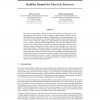263 search results - page 24 / 53 » Regret Bounds for Prediction Problems |
RTSS
2006
IEEE
14 years 3 months ago
2006
IEEE
Caches have become invaluable for higher-end architectures to hide, in part, the increasing gap between processor speed and memory access times. While the effect of caches on timi...
CDC
2008
IEEE
14 years 4 months ago
2008
IEEE
Abstract— In this paper we present a dual-based decomposition method, called here the proximal center method, to solve distributed model predictive control (MPC) problems for cou...
NIPS
2007
13 years 11 months ago
2007
The notion of algorithmic stability has been used effectively in the past to derive tight generalization bounds. A key advantage of these bounds is that they are designed for spec...
CDC
2008
IEEE
14 years 4 months ago
2008
IEEE
— The practical implementation of Min-Max MPC (MMMPC) controllers is limited by the computational burden required to compute the control law. This problem can be circumvented by ...
CLUSTER
2008
IEEE
14 years 4 months ago
2008
IEEE
—Scientific simulation and modeling often aid in making critical decisions in such diverse fields as city planning, severe weather prediction and influenza modeling. In some o...

